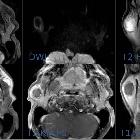parotid lipoma
Parotid lipomas are rare benign non-epithelial salivary gland neoplasms. They show the characteristic imaging features of fat-containing lesions and resemble lipomas that can occur elsewhere in the body.
Epidemiology
Parotid lipomas account for 0.6-4.4% of documented benign parotid tumors. Mean age at manifestation of lipoma is more than 50 years and they demonstrate a predisposition for male gender.
Risk factors
Parotid lipomas may be related to :
- chronic alcoholism
- malnutrition with hormonal/metabolic irregularities
- medication
Clinical presentation
Facial swelling, facial outline deformity and sometimes facial nerve palsy.
Pathology
Parotid lipomas are well-defined soft tissue lesions, usually encapsulated, and comprised primarily of fat. Any non-adipose segments must be carefully evaluated to eliminate a more aggressive element.
Histology
Indicates mature adipocytes with no cellular atypia or isomorphism. A thin fibrous capsule encircling a tumor of mature similarly sized adipocytes. Tumor capsule detection may benefit in differentiating such a neoplasm from lobular lipomatous atrophy and pseudolipoma all of which are non encapsulated .
Radiographic features
US
- parotid lipomas are commonly well-circumscribed with parallel linear echogenic lines
- variable appearance, hyperechoic to adjacent muscle and sometimes isoechoic or hypoechoic
CT
- lipomas retain the conventional features of homogeneous lesions with occasional septations
- density of -50 to -150 HU
- no post-contrast enhancement
MRI
MRI is the modality of choice to visualize parotid neoplasms, giving the adequate soft tissue description and repeatedly enabling visualization of the tumor capsule from adipose tissue . Parotid lipomas demonstrate:
T1: high signal
T2: low signal
fat-suppressed T1W: complete suppression of signal as tumors of adipocytic lineage
Differential diagnosis
- lobular lipomatous atrophy
- pseudolipoma
- oncocytic lipoadenomas
- primary or metastatic parotid masses
Siehe auch:
und weiter:

 Assoziationen und Differentialdiagnosen zu Lipom der Glandula parotis:
Assoziationen und Differentialdiagnosen zu Lipom der Glandula parotis:

